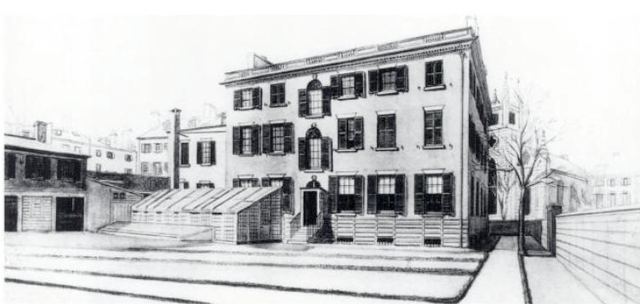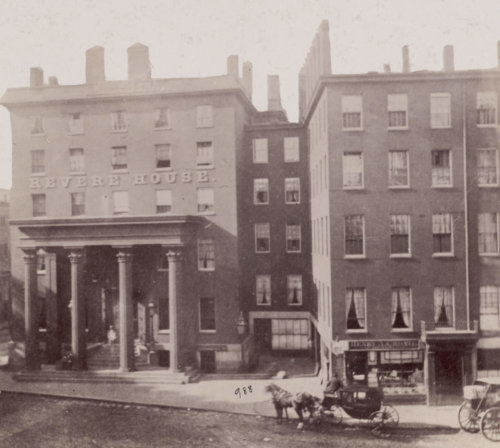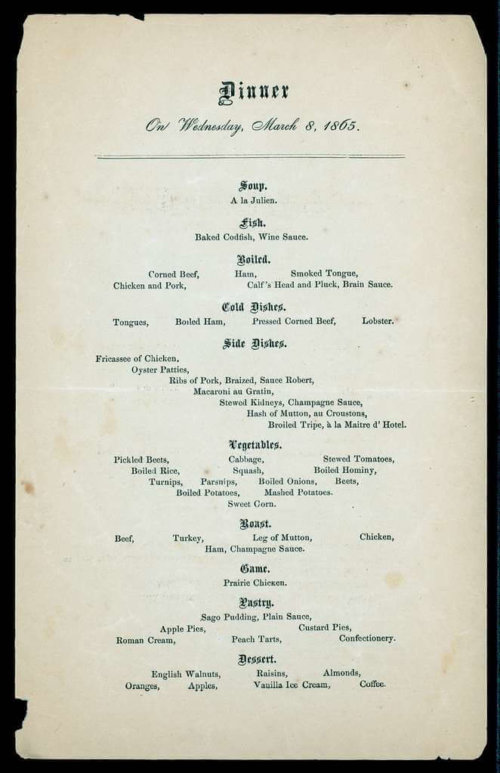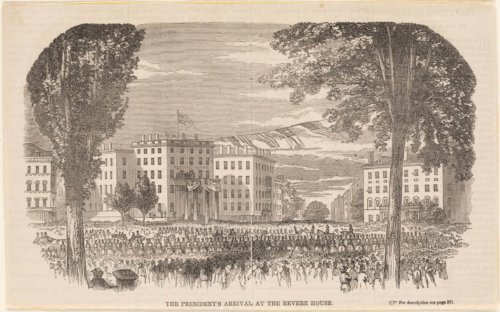The Revere House: The West End’s Grand Hotel
From before the Civil War into the early 19th century, the Revere House was considered Boston’s most prestigious hotel, catering to the city’s elite and discerning guests from around the world.
The story of the Revere House hotel began in an unlikely setting: the meeting room of the Massachusetts Charitable Mechanic Association (MCMA). The MCMA was founded by legendary Boston patriot Paul Revere and other craftsmen in 1795 to “promote the mechanical arts and provide funds for members’ widows and families.” Fifty years after its founding, the MCMA was in search of a location to serve as a meeting hall and trade school. In April of 1844, a special committee reported to members that it had purchased “the Boott estate, for the sum of forty-six thousand dollars” as a site for its planned project.
The newly acquired property sat on a piece of land formerly known as “Bulfinch’s Pasture” on Bowdoin Square and Bulfinch Street. Here, in 1804, English-born merchant Kirk Boott, who was at this time “at the height of his prosperity,” built a “three-story Federal mansion” with “tall, Palladian windows lighting the staircase.” Owing to the style, some have speculated it may have been designed by Charles Bulfinch. Being from a gardening family back home in Derby, Boott built a greenhouse and stable on the property, and even kept a cow. Kirk Boott died in 1817, leaving behind a wife, nine children, and the Bowdoin Square mansion.
During the rebuilding of Boston after the American Revolution, some wealthy residents, like Boott, sought remaining areas of open space in the town where they could build more impressive homes. They were drawn to the industrial West End, which up to this time had been ignored for residential development. It was here, near the site of Boston’s bowling green, where architects and builders designed and erected some of Boston’s finest mansions, in what would become its most desirable neighborhood, Bowdoin Square.
For two years, the MCMA created plans for the redevelopment of the Boott property and attempted to raise enough funds for the project, but in the end found the enterprise too costly. Members decided instead to use the home and land as an investment. In 1846, they voted to rename the existing building the “Revere House,” in honor of their first president, and to transform the Boott estate into a “first rate hotel.” Using part of the Boott mansion, William Washburn designed the Revere House “as a large and well-appointed hotel, with 250 rooms.” Upon its completion in 1847, the MCMA leased the Revere House to Paren Stevens for ten years “at a rent of twelve thousand dollars per annum.”
Paran Stevens (1802-1872) was born in New Hampshire and moved to Boston where he worked for local hotels and ran his own coffee shop. After acquiring the leasing rights from the MCM, he quickly turned the Revere House into Boston’s most up-scale hotel, befitting the reputation of wealthy Bowdoin Square. Stevens gained a reputation for having the best wine cellar in the country and, according to Walt Whitman during a visit in 1888, served “first rate grub (too good, I am tempted too much).” Based on his success at the Revere House (of which he bought part ownership), Stevens would move on to buy more hotels in Boston, New York, and Philadelphia, becoming one of the country’s most successful hoteliers.
The Revere House became the prime destination for hosting local parties and functions – that is, if one could schedule around the long line of national and foreign dignitaries entertained there. The impressive list of guests included Charles Dickens, Ulysses S. Grant, Millard Fillmore, Franklin Pierce, Andrew Johnson, William Tecumseh Sherman, Walt Whitman, Edward VII, Emperor Pedro II of Brazil, Philip Sheridan, the Iwakura Mission of Japan, singers Christina Nilsson and Adelina Patti, and Grand Duke Alexei Alexandrovich of Russia. The hotel hosted infamous guests as well. In 1854, Col. Charles Suttle, owner of escaped slave and Boston resident Anthony Burns, stayed at the hotel while searching for Burns. His peace there, however, was short-lived. Upon hearing of his arrival, abolitionists harassed him, and later the Boston Police arrested him on the charge of conspiracy to kidnap. After his release, he returned to the hotel, but with an armed guard, due to the death threats directed at him. The Revere House was also the preferred meeting place of the conspirators in the attempted murder case of Mary Somerset Mellen.
As the fortunes of Bowdoin Square fell, so did those of the Revere House. Commercial and population growth during the Industrial Age caused the wealthy to move further afield to Back Bay and the suburbs. Departing owners sold off their mansions, which new owners divided into boarding houses to feed the growing demand for housing. New, finer hotels established themselves in the city, making it impossible for later owners of the Revere House to compete. Ultimately, in 1912, a fire destroyed the once grand hotel. It started in the basement and “mushroomed out on the various floors, spreading in this way through all five floors and the attic of the building, so that to the hurriedly awakened occupants it seemed as though the entire place were a bed of flames.” In the end, 13 people, including a fireman, died in the blaze. Today the former site of the glorious Revere House, roughly 100 Cambridge Street, is home to government offices, businesses, and a university.
Article by Bob Potenza, edited by Grace Clipson.
Sources:
https://whitmanarchive.org/biography/correspondence/tei/med.00649.html#med.00649_n1; https://en.wikipedia.org/wiki/Revere_House; https://www.nps.gov/places/revere-house-hotel.htm; https://www.bostonmagazine.com/news/2014/01/30/throwback-thursday-revere-house-hotel-burned/; Harold Kirker, The Architecture of Charles Bulfinch (Harvard University Press, 1969); https://www.masshist.org/collection-guides/view/fa0169; Joseph Buckingham, Annals of the Massachusetts Charitable Mechanic Association, Mass. Charitable Mechanic Association; https://househistree.com/people/paran-stevens; https://www.biblio.com/book/revere-house-paran-stevens-boston-july/d/1507362380.













